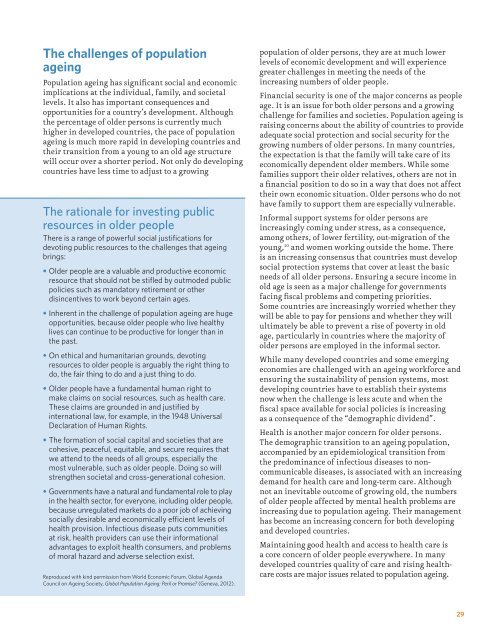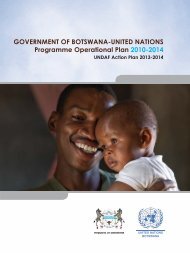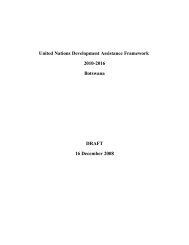Ageing in the Twenty-First Century: - HelpAge International
Ageing in the Twenty-First Century: - HelpAge International
Ageing in the Twenty-First Century: - HelpAge International
You also want an ePaper? Increase the reach of your titles
YUMPU automatically turns print PDFs into web optimized ePapers that Google loves.
The challenges of population<br />
age<strong>in</strong>g<br />
Population age<strong>in</strong>g has significant social and economic<br />
implications at <strong>the</strong> <strong>in</strong>dividual, family, and societal<br />
levels. It also has important consequences and<br />
opportunities for a country’s development. Although<br />
<strong>the</strong> percentage of older persons is currently much<br />
higher <strong>in</strong> developed countries, <strong>the</strong> pace of population<br />
age<strong>in</strong>g is much more rapid <strong>in</strong> develop<strong>in</strong>g countries and<br />
<strong>the</strong>ir transition from a young to an old age structure<br />
will occur over a shorter period. Not only do develop<strong>in</strong>g<br />
countries have less time to adjust to a grow<strong>in</strong>g<br />
The rationale for <strong>in</strong>vest<strong>in</strong>g public<br />
resources <strong>in</strong> older people<br />
There is a range of powerful social justifications for<br />
devot<strong>in</strong>g public resources to <strong>the</strong> challenges that age<strong>in</strong>g<br />
br<strong>in</strong>gs:<br />
• Older people are a valuable and productive economic<br />
resource that should not be stifled by outmoded public<br />
policies such as mandatory retirement or o<strong>the</strong>r<br />
dis<strong>in</strong>centives to work beyond certa<strong>in</strong> ages.<br />
• Inherent <strong>in</strong> <strong>the</strong> challenge of population age<strong>in</strong>g are huge<br />
opportunities, because older people who live healthy<br />
lives can cont<strong>in</strong>ue to be productive for longer than <strong>in</strong><br />
<strong>the</strong> past.<br />
• On ethical and humanitarian grounds, devot<strong>in</strong>g<br />
resources to older people is arguably <strong>the</strong> right th<strong>in</strong>g to<br />
do, <strong>the</strong> fair th<strong>in</strong>g to do and a just th<strong>in</strong>g to do.<br />
• Older people have a fundamental human right to<br />
make claims on social resources, such as health care.<br />
These claims are grounded <strong>in</strong> and justified by<br />
<strong>in</strong>ternational law, for example, <strong>in</strong> <strong>the</strong> 1948 Universal<br />
Declaration of Human Rights.<br />
• The formation of social capital and societies that are<br />
cohesive, peaceful, equitable, and secure requires that<br />
we attend to <strong>the</strong> needs of all groups, especially <strong>the</strong><br />
most vulnerable, such as older people. Do<strong>in</strong>g so will<br />
streng<strong>the</strong>n societal and cross-generational cohesion.<br />
• Governments have a natural and fundamental role to play<br />
<strong>in</strong> <strong>the</strong> health sector, for everyone, <strong>in</strong>clud<strong>in</strong>g older people,<br />
because unregulated markets do a poor job of achiev<strong>in</strong>g<br />
socially desirable and economically efficient levels of<br />
health provision. Infectious disease puts communities<br />
at risk, health providers can use <strong>the</strong>ir <strong>in</strong>formational<br />
advantages to exploit health consumers, and problems<br />
of moral hazard and adverse selection exist.<br />
Reproduced with k<strong>in</strong>d permission from World Economic Forum, Global Agenda<br />
Council on <strong>Age<strong>in</strong>g</strong> Society, Global Population <strong>Age<strong>in</strong>g</strong>: Peril or Promise? (Geneva, 2012).<br />
population of older persons, <strong>the</strong>y are at much lower<br />
levels of economic development and will experience<br />
greater challenges <strong>in</strong> meet<strong>in</strong>g <strong>the</strong> needs of <strong>the</strong><br />
<strong>in</strong>creas<strong>in</strong>g numbers of older people.<br />
F<strong>in</strong>ancial security is one of <strong>the</strong> major concerns as people<br />
age. It is an issue for both older persons and a grow<strong>in</strong>g<br />
challenge for families and societies. Population age<strong>in</strong>g is<br />
rais<strong>in</strong>g concerns about <strong>the</strong> ability of countries to provide<br />
adequate social protection and social security for <strong>the</strong><br />
grow<strong>in</strong>g numbers of older persons. In many countries,<br />
<strong>the</strong> expectation is that <strong>the</strong> family will take care of its<br />
economically dependent older members. While some<br />
families support <strong>the</strong>ir older relatives, o<strong>the</strong>rs are not <strong>in</strong><br />
a f<strong>in</strong>ancial position to do so <strong>in</strong> a way that does not affect<br />
<strong>the</strong>ir own economic situation. Older persons who do not<br />
have family to support <strong>the</strong>m are especially vulnerable.<br />
Informal support systems for older persons are<br />
<strong>in</strong>creas<strong>in</strong>gly com<strong>in</strong>g under stress, as a consequence,<br />
among o<strong>the</strong>rs, of lower fertility, out-migration of <strong>the</strong><br />
young, 20 and women work<strong>in</strong>g outside <strong>the</strong> home. There<br />
is an <strong>in</strong>creas<strong>in</strong>g consensus that countries must develop<br />
social protection systems that cover at least <strong>the</strong> basic<br />
needs of all older persons. Ensur<strong>in</strong>g a secure <strong>in</strong>come <strong>in</strong><br />
old age is seen as a major challenge for governments<br />
fac<strong>in</strong>g fiscal problems and compet<strong>in</strong>g priorities.<br />
Some countries are <strong>in</strong>creas<strong>in</strong>gly worried whe<strong>the</strong>r <strong>the</strong>y<br />
will be able to pay for pensions and whe<strong>the</strong>r <strong>the</strong>y will<br />
ultimately be able to prevent a rise of poverty <strong>in</strong> old<br />
age, particularly <strong>in</strong> countries where <strong>the</strong> majority of<br />
older persons are employed <strong>in</strong> <strong>the</strong> <strong>in</strong>formal sector.<br />
While many developed countries and some emerg<strong>in</strong>g<br />
economies are challenged with an age<strong>in</strong>g workforce and<br />
ensur<strong>in</strong>g <strong>the</strong> susta<strong>in</strong>ability of pension systems, most<br />
develop<strong>in</strong>g countries have to establish <strong>the</strong>ir systems<br />
now when <strong>the</strong> challenge is less acute and when <strong>the</strong><br />
fiscal space available for social policies is <strong>in</strong>creas<strong>in</strong>g<br />
as a consequence of <strong>the</strong> “demographic dividend”.<br />
Health is ano<strong>the</strong>r major concern for older persons.<br />
The demographic transition to an age<strong>in</strong>g population,<br />
accompanied by an epidemiological transition from<br />
<strong>the</strong> predom<strong>in</strong>ance of <strong>in</strong>fectious diseases to noncommunicable<br />
diseases, is associated with an <strong>in</strong>creas<strong>in</strong>g<br />
demand for health care and long-term care. Although<br />
not an <strong>in</strong>evitable outcome of grow<strong>in</strong>g old, <strong>the</strong> numbers<br />
of older people affected by mental health problems are<br />
<strong>in</strong>creas<strong>in</strong>g due to population age<strong>in</strong>g. Their management<br />
has become an <strong>in</strong>creas<strong>in</strong>g concern for both develop<strong>in</strong>g<br />
and developed countries.<br />
Ma<strong>in</strong>ta<strong>in</strong><strong>in</strong>g good health and access to health care is<br />
a core concern of older people everywhere. In many<br />
developed countries quality of care and ris<strong>in</strong>g healthcare<br />
costs are major issues related to population age<strong>in</strong>g.<br />
29







